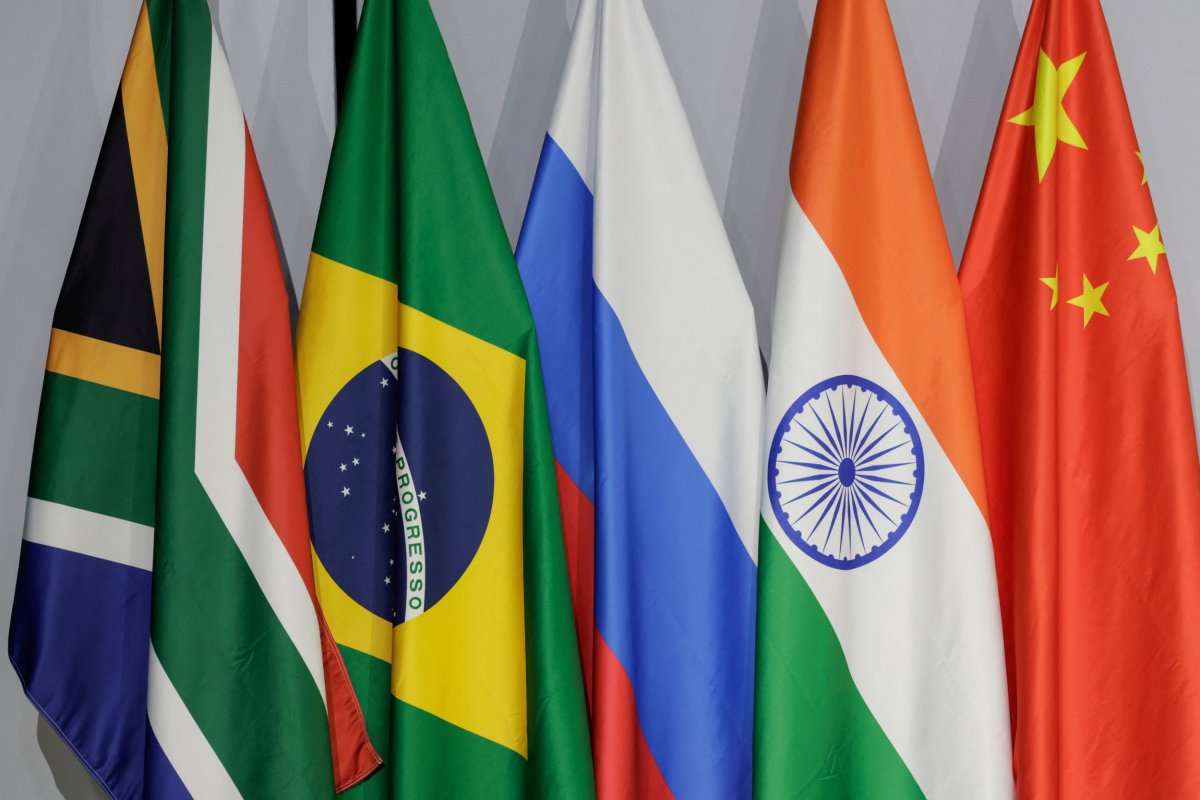This month’s high-level global summit underscores the deepening geopolitical divides that increasingly define world politics and threaten U.S. interests. Media and observers paid close attention to the G7 and Ukraine peace summits. But in the same week, a pivotal, under-the-radar meeting took place in western Russia, as BRICS foreign ministers gathered with their counterparts from nearly two dozen Global South countries. Like the G7 and Ukraine summits, the BRICS meeting didn’t result in revelatory policy initiatives. However, it showed that more and more nations are aggrieved by U.S. policy, looking for alternatives to Washington’s leadership and want to be part of the de-dollarization trend.
Brazil, Russia, India, and China began the BRICS project in 2006, seeking to reform international finance institutions like the IMF and World Bank. South Africa later joined in 2010. The group formed the New Development Bank in 2014 but never gathered momentum or coherence until recently.
Early this year, important regional powers Iran, Ethiopia, Egypt, and the United Arab Emirates (UAE) officially joined the group. Before the June meeting, Moscow’s ambassador to China said that “the number of states interested in BRICS is much bigger than this entity can absorb now,” with nearly 30 countries hoping to receive an invitation. Countries like Turkey, a NATO member that has long sought admission to the European Union, and Thailand, which has historically been content to sit on the geopolitical sidelines, now want to join BRICS.
One doesn’t need a crystal ball to divine their motivations. The top diplomats from BRICS and the Global South spoke of the need to build new security, governance, and finance architectures to supplant the current U.S.-led systems that they believe only serve Western interests. BRICS features Global South countries’ concerns and grievances front and center—this rarely happens in Western-led international fora. In fact, anti-Western grievances are the political valence that brings together BRICS members and Global South countries.
BRICS states account for more than 40 percent of the world’s population, 28 percent of the world’s economic output, and 47 percent of global crude oil. An enlarged BRICS with more oil producers and regional powers should be particularly concerning for the U.S., as it could advance de-dollarization.
One way in which the group is subverting the dollar’s dominance is by encouraging “enhanced use of local currencies in trade and financial transactions between” BRICS countries, said a joint statement from their June meeting. China has been at the forefront of this effort as it seeks to internationalize its currency. Since Russia’s 2022 invasion of Ukraine, China has ramped up its use of the yuan to buy Russian commodities, particularly oil, and the renminbi has overtaken the U.S. dollar as the primary currency for Chinese-Russian trade. China has been in talks with other major oil producers like Iran, Iraq, and Saudi Arabia to move toward more extensive use of the yuan to settle oil transactions.
In 2023, an estimated 20 percent of global oil was bought and sold in currencies other than the U.S. dollar. Countries like Iran and Russia, under heavy U.S. sanctions, are not the only ones looking to diversify. Even Brazil, the UAE, and Saudi Arabia are moving to protect themselves from the impact of Western sanctions on oil and other commodity trade. To further move away from the dollar, China is selling off its U.S. dollar assets, and China and Russia have bought record levels of gold in recent years.
This effort to undermine the dollar will have serious ramifications for the U.S. and its economy, particularly in this inflationary era. Since the 1970s, the U.S. dollar has been the primary currency—known as the petrodollar—for oil transactions. This drives demand for the dollar and helps it maintain its value and role as the world’s global reserve currency. As a result, the U.S. generally has lower borrowing costs, can run deficits, and print money at its discretion, propping up Americans’ standard of living.

MICHELE SPATARI/AFP via Getty Images
But U.S. policies, particularly sanctions policy, are undermining the dollar, and by extension, the U.S. economy and Washington’s global standing. U.S. sanctions cover 29 percent of the global economy and 40 percent of global oil reserves. Washington’s reflexive and extensive deployment of sanctions has been an abject failure in the aggregate. The U.S. frequently deploys this tool to coerce states to change their behavior, but it rarely works—just look at Cuba.
Not only are these sanctions not having their intended effect, but they are “inadvertently creat[ing] an ‘Axis of Evasion'” among Russia, Iran, Venezuela, North Korea, and China, who are banding together to mitigate their limited access to Western markets.
For so long, the U.S. has considered itself “the indispensable nation.” However, many nations in today’s multipolar world see U.S. hegemony upheld by hectoring and hypocrisy. They perceive hypocrisy in Washington’s irreconcilable stances on the wars in Gaza and Ukraine and sense that the rules-based order only applies to the West’s adversaries.
Reports of the dollar’s imminent demise are surely overblown. A unified BRICS currency will not come to fruition anytime soon. Still, the de-dollarization trend and what it signifies about perceptions of the U.S. should lead Washington to take stock of what is driving BRICS and Global South nations together to replace the dollar. The U.S. must reconsider its unyielding commitment to primacy, its knee-jerk use of sanctions, and its hypocritical stance on the “rules-based order” before it is too late. Restraint is needed as vast swathes of the world are coming together to sidestep the U.S. dollar and supplant U.S. leadership.
Adam Gallagher is a foreign policy analyst and writer covering U.S. foreign policy in the Middle East and geopolitics. For more of his writing and analysis, follow him on X @AEGallagher10.
The views expressed in this article are the writer’s own.
Uncommon Knowledge
Newsweek is committed to challenging conventional wisdom and finding connections in the search for common ground.
Newsweek is committed to challenging conventional wisdom and finding connections in the search for common ground.



